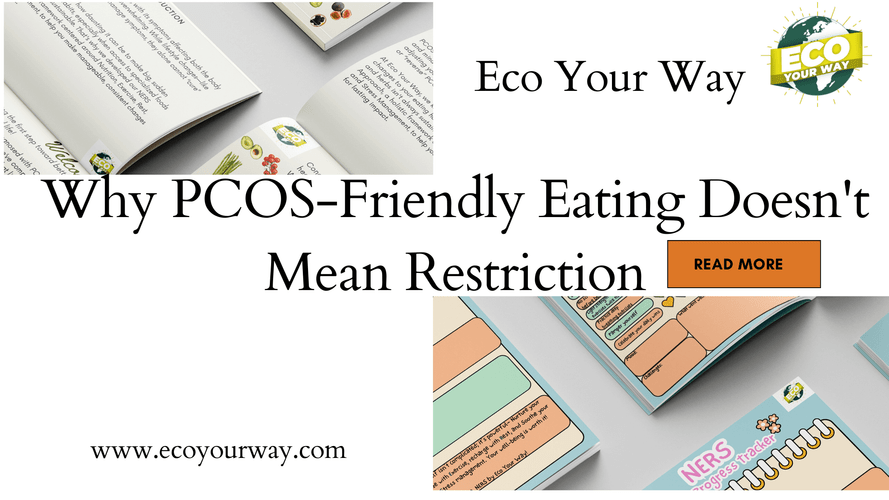Why PCOS-Friendly Eating Doesn't Mean Restriction
May 18th 2025
Rundown
PCOS & Nutrition: Breaking the Restriction Myth
What Does PCOS-Friendly Eating Actually Look Like?
Why Extreme Diets Fail for PCOS
Expand Your PCOS-Friendly Eating with Global Flavors
Track Your Progress with the Eco Your Way PCOS Progress Tracker
Embracing a Holistic Approach
Conclusion
PCOS & Nutrition: Breaking the Restriction Myth
Polycystic Ovary Syndrome (PCOS) affects millions of women worldwide, influencing hormonal balance, metabolism, fertility, diabetes, and overall well-being. Managing PCOS through diet is essential, but it's crucial to understand that PCOS-friendly eating doesn't equate to restriction. Instead, it's about making informed, nourishing choices that support your body's unique needs.
If you’ve been diagnosed with Polycystic Ovary Syndrome (PCOS) (or believe you may have it), chances are you’ve heard conflicting advice about what to eat. Some say cut out carbs completely, others push extreme diets, and many believe that PCOS-friendly eating means giving up all your favorite foods.
Here’s the truth: PCOS-friendly eating is not about restriction; it’s about balance.
Instead of eliminating entire food groups, the key is supporting hormonal health with nutrient-dense, sustainable choices that work for YOUR body.
What Does PCOS-Friendly Eating Actually Look Like?
PCOS-friendly eating focuses on whole, nutrient-dense foods that help regulate insulin levels, reduce inflammation, and support hormonal balance. This approach emphasizes:
- Low Glycemic Index (GI) Carbohydrates: Foods like whole grains, legumes, and non-starchy vegetables that help stabilize blood sugar levels. Fertility Centers of New England
- Lean Proteins: Sources such as poultry, fish, tofu, and legumes that aid in muscle maintenance and satiety. SELF+11Fertility Centers of New England+11RMA Network - Fertility Clinic+11
- Healthy Fats: Incorporating fats from avocados, olive oil, nuts, seeds, and fatty fish to support hormone production and reduce inflammation. RMA Network - Fertility Clinic
- High-Fiber Foods: Including fruits, vegetables, and whole grains to improve digestion and blood sugar control.
This approach is not about eliminating foods but about making balanced choices that nourish the body.
A PCOS-friendly diet focuses on stabilizing blood sugar, reducing inflammation, and supporting hormone balance, all without extreme restrictions.
- Balanced Carbs – Instead of cutting carbs, focus on fiber-rich, slow-digesting options like quinoa, sweet potatoes, and whole grains.
- Healthy Fats – Omega-3s and anti-inflammatory fats from avocados, nuts, seeds, and olive oil help regulate hormones.
- Protein Power – Lean proteins like chicken, fish, tofu, and legumes keep blood sugar stable and support metabolism.
- Smart Sugar Choices – Instead of eliminating sugar, opt for natural sources like fruit and avoid excessive refined sugars.
Restriction leads to frustration. Balance leads to long-term success.
Why Extreme Diets Fail for PCOS
Many believe that managing PCOS requires strict dietary restrictions. However, this mindset can lead to:
- Nutrient Deficiencies: Eliminating entire food groups can result in missing out on essential nutrients.
- Increased Cravings and Binge Eating: Restricting foods often leads to heightened cravings and potential overeating
- Emotional Stress: The pressure of adhering to restrictive diets can cause anxiety and stress, negatively impacting overall health.
Instead of restriction, focus on inclusion and balance. Allow yourself to enjoy a variety of foods in moderation, which can lead to a healthier relationship with food and better management of PCOS symptoms.
Many people with PCOS try keto, intermittent fasting, or ultra-low-carb diets, and may be left feeling hungry, exhausted, deprived, and stuck in a cycle of restriction and bingeing.
Here’s why these may not work for you:
- They’re hard to maintain long-term
- They can increase stress and cortisol levels—worsening PCOS symptoms
- They don’t address the root cause of hormonal imbalance
Instead of short-term fixes, focus on sustainable habits that support your metabolism, insulin sensitivity, and overall well-being.
Expand Your PCOS-Friendly Eating with Global Flavors
Eating for PCOS doesn’t have to be bland or restrictive, it can be vibrant, flavorful, and culturally diverse! The Eco Your Way Conquer PCOS with Multicultural Flavors guide introduces nourishing meal ideas inspired by global cuisines, proving that PCOS-friendly eating can be exciting and deeply satisfying. From spice-rich anti-inflammatory dishes to fiber-packed traditional meals, this resource helps you embrace variety while supporting hormonal balance.
Track Your Progress with the Eco Your Way PCOS Progress Tracker
For those seeking a practical tool to navigate their PCOS journey, the Eco Your Way NERS PCOS Progress Tracker offers a structured yet flexible approach. This tracker focuses on four key areas: Nutrition, Exercise, Rest, and Stress Management (NERS).
Key Features:
- Daily Habits Tracking: Monitor your daily habits related to nutrition, exercise, rest, and stress management.
- Weekly Reflections: Assess your progress weekly to celebrate wins and identify areas for improvement.
- Monthly Rewards: Set and achieve monthly goals, rewarding yourself for consistency and progress.
The tracker emphasizes that progress is about persistence, not perfection. It encourages small, sustainable steps that lead to significant results over time. Small steps = BIG results!
If you’re ready to take control of your PCOS journey, the Eco Your Way PCOS Progress Tracker is your ultimate tool for tracking progress, building sustainable habits, and seeing real improvements in your health.
Start to monitor your Nutrition, Exercise, Sleep, and Stress management. Stay accountable without feeling overwhelmed, and do not forget to celebrate small wins that lead to lasting change!
Your journey to balance starts here!
Embracing a Holistic Approach
Managing PCOS is not solely about diet; it's about adopting a holistic lifestyle that includes:
- Regular Physical Activity: Engaging in exercises like walking, yoga, or strength training to improve insulin sensitivity and overall health.
- Adequate Sleep: Ensuring 7-9 hours of quality sleep per night to support hormonal balance.
- Stress Management: Practicing mindfulness, meditation, or other relaxation techniques to reduce stress levels.
- Emotional Well-being: Cultivating a positive mindset and seeking support when needed to maintain mental health.
By integrating these practices, you can create a balanced lifestyle that supports your body and mind.
Conclusion
PCOS-friendly eating is about nourishing your body with a variety of whole, nutrient-rich foods. It's not about restriction but about making informed choices that support your health and well-being. Tools like the Eco Your Way NERS PCOS Progress Tracker can provide structure and motivation on your journey. Remember, managing PCOS is a marathon, not a sprint. Celebrate your progress, no matter how small, and continue taking steps toward balance and health.
PCOS-friendly eating isn’t about restriction—it’s about making choices that support your body.
- You don’t have to be perfect. You just have to be consistent.
- Small, sustainable changes lead to long-term success.
- Your health is worth more than a fad diet—choose balance over extremes.

